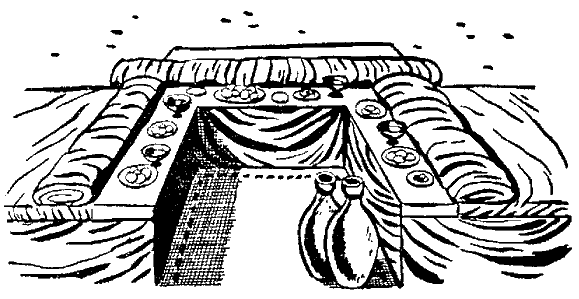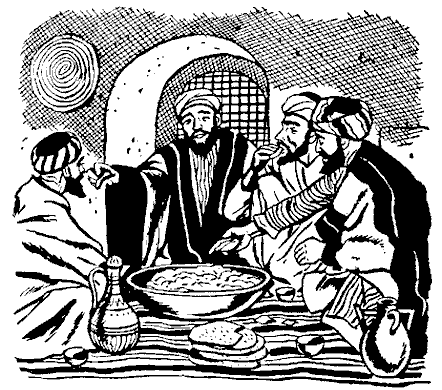A behavior that was considered a serious fault throughout the history of the Church, is now widespread. The St. Basil’s paradox.
Lord, I am not worthy that you should enter under my roof, but I feel worthy enough to touch you with my hands…
In the past, Communion in the hand was allowed only at times of persecution, in which professing the Christian faith meant torture and martyrdom when discovered. But for half a century until now, this condemned practice, is now spread worldwide. Is this one of the reasons why the persecution of Christians is now the highest in the world? Are we attracting our own evil?
As the persecution of the disciples of Christ is becoming a worldwide reality, it seems the paradoxical statement of St. Basil proves also to be valid again: “Communion in the hand is allowed only in two instances, 1) under times of persecution where no priest is Present, and 2) for hermits and ascetics in the wilderness who have no priests.” (ca. 330-379) You may say we have priests right now, but we are foretold what to expect for the times to come.
While God is not vengeful, the Holy Scriptures have plenty of demonstrations of the consequences to disobedience and turning from His ways. If the warnings of the Lord are heard, his Holy anger ceases (see Jonah 3:4-6 on the reaction of the Ninevites) but if the people persists in evil without making ammendments, the divine warnings become a reality:
“Yet ye have not hearkened unto me, saith the Lord; that ye might provoke me to anger with the works of your hands to your own hurt. Therefore, thus saith the Lord of armies; Because ye have not heard my words, Behold, I will send and take all the families of the north, saith the Lord, and Nebuchadnezzar the king of Babylon, my servant, and will bring them against this land, and against the inhabitants thereof, and against all these nations round about, and will utterly destroy them, and make them an astonishment, and an hissing, and perpetual desolations. Moreover, I will take from them the voice of mirth, and the voice of gladness, the voice of the bridegroom, and the voice of the bride, the sound of the millstones, and the light of the candle. And this whole land shall be a desolation, and an astonishment; and these nations shall serve the king of Babylon seventy years.” (Jer. 25:7-11)
How did the apostles first Communion was?
To have a better understanding of that which is most probable let’s look into the studies of Fred H. Wight (Servant of the Lord for many years, who studied in depth archaeology and other related disciplines, standing out in the field of biblical times customs). In his book “Manners and Customs of Bible Lands” he studies and exhibits in great detail the ancient oriental customs, many of which are maintained until today. Let’s read what he says about the oriental tradition for banquets and how they used to host them:
Posture while eating at Feasts
The prophet Amos is the first sacred writer to refer to the custom of “stretching themselves upon their couches” when eating (Amos 6:4). By the time of Jesus, the Roman custom of reclining on couches at supper had been adopted in some Jewish circles. The Roman table and couches combined was called a triclinium. There were three couches which were located on the three sides of a square, the fourth side being left open, so that a servant could get on the inside to assist in serving the meal. The guest’s position was to recline with the body’s upper part resting on the left arm, and the head raised, and a cushion at the back, and the lower part of the body stretched out. The head of the second guest was opposite the breast of the first guest, so that if he wanted to speak to him in secret he would lean upon his breast.
This custom at a banquet table throws light on several passages from the four gospels. The Apostle John asked Jesus a question while in this position at supper (John 13:23-25).

Dipping into the dish and giving the sop
Oriental customs of eating must be kept in mind in order to understand the meaning of the words and action of Jesus, in relation to Judas Iscariot at the last supper. Mark’s account reads:
Jesus said, Verily I say unto you, One of you which eateth with me shall betray me. And they began to be sorrowful, and to say unto him one by one, Is it I? and another said, Is it I? And he answered and said unto them, It is one of the twelve, that dippeth with me in the dish. (Mark 14:18-20).
Some have supposed that Judas was in the position where he would be dipping at the same time with Jesus into the dish, and that he was thus singled out as the betrayer. But this could hardly be, since the other disciples did not discover who the betrayer was from these words of Jesus. Since they all had been eating from the same large dish, these words of Jesus, “he that dippeth with me in the dish,” did not identify any one of them. All of them, as well as Judas, had been dipping into the dish with Jesus. Jesus was simply informing them that one of them now eating with him would become his betrayer.

Again, Christ’s giving of the “sop” to Judas was in accordance with certain Eastern custom still observed in modern times. John reports what was done and said:
He then lying on Jesus’ breast said unto him, Lord, who is it? Jesus answered, He it is, to whom I shall give a sop, when I have dipped it. And when he had dipped the sop, he gave it to Judas Iscariot (John 13:25, 26).
What is meant by the “sop”? It is the most tasty morsel of food being served at the feast. It may be served in the “bread spoon”, but is more often picked up by the host with his thumb and finger, and handed directly to one of the guests. But why is a sop given to one of the guests? A native and resident of Bible lands says that certain villagers there have this custom of giving the sop today, and he describes the purpose of the act thus:
“It is with them a mark of special respect for the master of the feast to hand to a guest portions of what is before him, or to insist on putting morsels or sops into his mouth with his own hand. I have had this done to me several times, when the intention was certainly to honor and manifest good will”.
The meaning of what Christ did then was most certainly to extend love and friendship to the very one who was going to betray him. The act has been described as if the Lord were saying to the traitor:
Judas, my disciple, I have infinite pity for you. You have proved false, you have forsaken me in your heart; but I will not treat you as an enemy, for I have come not to destroy, but to fulfill. Here is my sop of friendship, and “that thou doest do quickly.” (Fred H. Wight- Manners and Customs of Bible Lands)
Historical records that deny Communion in the hand
From the earliest times records are in favor of receiving communion exclusively in the mouth:
Pope St. Sixtus I (circa 115): “The Sacred Vessels are not to be handled by others than those consecrated to the Lord.”
Pope St. Eutychian (275-283): Forbade the faithful from taking the Sacred Host in their hand.
St. Basil the Great, Doctor of the Church (330-379): “The right to receive Holy Communion in the hand is permitted only in times of persecution.” St. Basil the Great considered Communion in the hand so irregular that he did not hesitate to consider it a grave fault.
The Council of Saragossa (380): Excommunicated anyone who dared continue receiving Holy Communion by hand. This was confirmed by the Synod of Toledo.
Pope St. Leo I the Great (440-461): Energetically defended and required faithful obedience to the practice of administering Holy Communion on the tongue of the faithful.
In his comments to the sixth chapter of the Gospel of St. John, S. Leo I speaks of Communion in the mouth as the established custom at that time (Sermon 91.3).
Pope St. Gregory the Great (590-604): In his Dialogs (Roman 3,c.3), accounts for a reference that shows that the Pope placed the Body of Christ in the mouth of believers.
The Synod of Rouen (650): Condemned Communion in the hand to halt widespread abuses that occurred from this practice, and as a safeguard against sacrilege.
The Sixth Ecumenical Council, at Constantinople (680-681): Forbade the faithful to take the Sacred Host in their hand, threatening transgressors with excommunication. The Council of Constantinople forbade believers to give Communion to themselves. The excommunication was decreed for a week for those who did it in the presence of a Bishop, a priest or a deacon.
Jesus Christ to St. Bridget of Sweden, (+ 1373): “My daughter, I gave my priests five presents (…), and in the fifth place the privilege of touching with their hands my Sacred Body”.
St. Thomas Aquinas (1225-1274): “Out of reverence towards this sacrament [the Holy Eucharist], nothing touches it, but what is consecrated; hence the corporal and the chalice are consecrated, and likewise the priest’s hands, for touching this sacrament.” (Summa Theologica, Part III, Q. 82, Art. 3, Rep. Obj. 8)
The Council of Trent (1545-1565): “The fact that only the priest gives Holy Communion with his consecrated hands is an Apostolic Tradition.”
Pope Paul VI (1963-1978): “This method [on the tongue] must be retained.” (Memoriale Domini)
Henri Leclercq: Renowned historian, in his Communion article in the Dictionary of Christian Archeology published at the beginning of the 20th century, he declares that the peace of Constantine brought the end of the practice of Communion in the hand. This reaffirms St Basil’s reasoning that it was the persecution that created the dilemma of not receiving it, or the lesser evil of receiving it in the hand. When the persecution ceased, evidently the practice of Communion in the hand persisted. It was considered an abuse by the authority of the Church, since it was judged contrary to the custom of the Apostles.
Pope John Paul II: To touch the sacred species and to distribute them with their own hands is a privilege of the ordained. (Dominicae Cenae, 11)
“It is not permitted that the faithful should themselves pick up the consecrated bread and the sacred chalice, still less that they should hand them from one to another.” (Inaestimabile Donum, April 17, 1980, sec. 9)
And so that no one would interpret these words in any other way, three months later, under the pressure of the French television cameras, he denied Communion in the hand to the wife of the Prime Minister, Giscard Déstaing. The same year, he declared in Fulda (Germany) that he did not agree with the Document authorizing this form of Communion in this Country. (“Vox Fidei”, n.10-1981; “Chiesa Viva”, n.112; “Sol de Fátima”, n.82).
St. Teresa of Calcutta: Fr. George William Rutler, said:”I will tell you a secret, since we have just a thousand close friends together, and also because we have the Missionaries of Charity with us, whom the Holy Spirit has sent into the world that the secrets of many hearts might be revealed. Not very long ago I said Mass and preached for their Mother, Mother Teresa of Calcutta, and after breakfast we spent quite a long time talking in a little room. Suddenly, I found myself asking her-I don’t know why- “Mother, what do you think is the worst problem in the world today?” She more than anyone could name any number of candidates: famine, plague, disease, the breakdown of the family, rebellion against God, the corruption of the media, world debt, nuclear threat, and so on. Without pausing a second she said, “Wherever I go in the whole world, the thing that makes me the saddest is watching people receive Communion in the hand.” (Fr. George William Rutler, Good Friday, 1989, sermon at St. Agnes Church, New York City. Transcribed by Ron McCloskey from the “St. Agnes Cassettes” recording.)*
* Afterwards, fr. Rutler said in an interview that Mother Teresa wanted him to retract the statement, because she was speaking of the inward disposition of the soul and not the physical manner of receiving Communion. She was distressed since the bishops had conceded both forms and she didn’t want to confront the bishops. (thanks to Kathleen for pointing this out).
How could it be then, that Communion in the hand got accepted?
Analyzing the evidence, it is difficult to understand. There is definitely no logical reason.
In some countries it has been reported that bishops have been pressured to illegally obtain their votes, once they secured two-thirds of the total votes, they asked the Holy See for official permission to carry out these practices in the country. Sadly, these new customs have been approved previously in the Vatican for the countries to apply them, and some official documents were published suggesting that communion in the mouth is actually the recent custom and not the other way around.
The most shameful thing is that ideological falsehood is observed within official documents, with claims such as that the apostles, disciples and first Christians received Holy Communion in their hands and this was the “common way of receiving it for centuries” (yak!), or citing dubious documents with instructions that indicated how they put their hands to receive it, as evidence of a practice -that as we mention above was never accepted. Generally they do not mention anything of the records exposed above, instead, they constantly use references of a text attributed to St. Cyril of Jerusalem, who lived in the IV century at the same time as St. Basil. Several documents are known from St. Cyril, but a number of them are in doubt because they do not seem legitimate. Obviously, they used these apocryphal documents to justify themselves: Dr. Henri LeClercq summarizes it as follows: “St. Cyril of Jerusalem recommended to the faithful that when they presented themselves to receive Communion, they should have their right hand extended, with their fingers joined, supported by the left hand, with the palm in a concave shape; and that at the moment when the Body of Christ was placed in his hand, the communicant should say: “Amen”. But the text continues, although obviously they omit this part. It also proposes the following: “Sanctify your eyes with the contact of the Sacred Body … When your lips are still wet with the precious Blood of Christ, take your hand to your lips, and pass your hand over your eyes, your forehead and your other organs of senses, to sanctify them“. This quite original recommendation led scholars to deny the authenticity of such text.
The arguments put are so shameful and refutable that it would be a mystery to explain how they managed to introduce the change, if the degree of infiltration of Freemasonry within the Catholic Church was not taken into account, acting from the hierarchical positions threatening and without fear, modifying customs and gradually degrading Christian morality, in addition to pretending to modify history, even daring to deny true facts and affirming falsehoods in public documents. It is the so-called ‘mystery of iniquity’ of how evil even infiltrates among those selected, maybe in the same proportion as in the times of Iscariot (1 to 12), something unfortunate that was already mentioned by St. Jude in his epistle:
What is God asking us for?
MY BODY AND MY BLOOD MUST BE TREATED WITH RESPECT; RECEIVE ME IN THE MOUTH, DO NOT TAKE ME IN THE HAND. YOU LET ME FALL WITHOUT NOTICING IT WHEN, AFTER RECEIVING ME IN YOUR HAND, THE PARTICLES OF MY SACRED BODY FALL ON THE FLOOR WHEN YOU LOWER YOUR HANDS CARELESSLY AND THROW ME TO THE GROUND. THIS IS NOT BECAUSE THE HAND IS NOT WORTHY OR PART OF THE BODY, BUT BECAUSE YOU DO NOT KNOW HOW TO TREAT ME AND IGNORE THE VALUE OF A SINGLE PARTICLE OF MY SACRED BODY.Our Lord Jesus Christ to Luz de María -Aug 9 2016





To attack the magisterium’ APPROVAL of communion in the hand is a subtle but real Satanic ATTACK on the credibility and competence of the Church of Jesus Christ.
The Pope and Cardinals allowed this! The people were deceived by them.